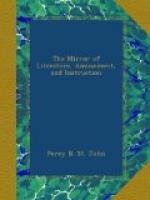...We mourn over the leaves of our peaches and plum-trees, as they wither under a blight. What does Paley see in this? A legion of animated beings (for such is a blight) claiming their portion of the bounty of Nature, and made happy by our comparatively trifling privation, We are tortured by bodily pain,—Paley himself was so, even at the moment that he was thus nobly vindicating God’s wisdom and ways. What of that? Pain is not the object of contrivance—no anatomist ever dreamt of explaining any organ of the body on the principle of the thumb screw; it is itself productive of good; it is seldom both violent, and long continued; and then its pauses and intermissions become positive pleasures. “It has the power of shedding a satisfaction over intervals of ease, which I believe,” says this true philosopher, “few enjoyments exceed.” The returns of an hospital in his neighbourhood lie before him. Does he conjure up the images of Milton’s lazar-house, and sicken at the spectacle of human suffering? No—he finds the admitted 6,420—the dead, 234—the cured, 5,476; his eye settles upon the last, and he is content.
There is nothing in the world which has not more handles than one; and it is of the greatest consequence to get a habit of taking hold by the best. The bells speak as we make them; “how many a tale their music tells!” Hogarth’s industrious apprentice might hear in them that he should be “Lord Mayor of London”—the idle apprentice that he should be hanged at Tyburn. The landscape looks as we see it; if we go to meet a friend, every distant object assumes his shape—
“In great and small, and round and
square,
’Tis Johnny, Johnny, every where.”
Crabbe’s lover passed over the very same heath to his mistress and from her; yet as he went, all was beauty—as he returned all was blank. The world does not more surely provide different kinds of food for different animals, than it furnishes doubts to the sceptic and hopes to the believer, as he takes it. The one, in an honest and good heart, pours out the box of ointment on a Saviour’s head—the other, in the pride of his philosophy, only searches into it for a dead fly.—Q. Rev.
* * * * *
“ALL FOR THE BEST.”
When Bernard Gilpin was summoned up to London to give an account of himself and his creed before Bonner, he chanced to break his leg on the way; and, on some persons retorting upon him a favourite saying of his own, “that nothing happens to us but what is intended for our good,” and asking him whether it was for his good that he had broken his leg, he answered, “that he made no question but it was.” And so it turned out, for before he was able to travel again, Queen Mary died, and he was set at liberty.
* * * * *
Men keep their word simply because it is right to do so. They feel it is right, and ask no further questions. Conscience carries along with it its own authority—its own credentials. The depraved appetites may rebel against it, but they are aware that it is rebellion.—Q. Rev.




